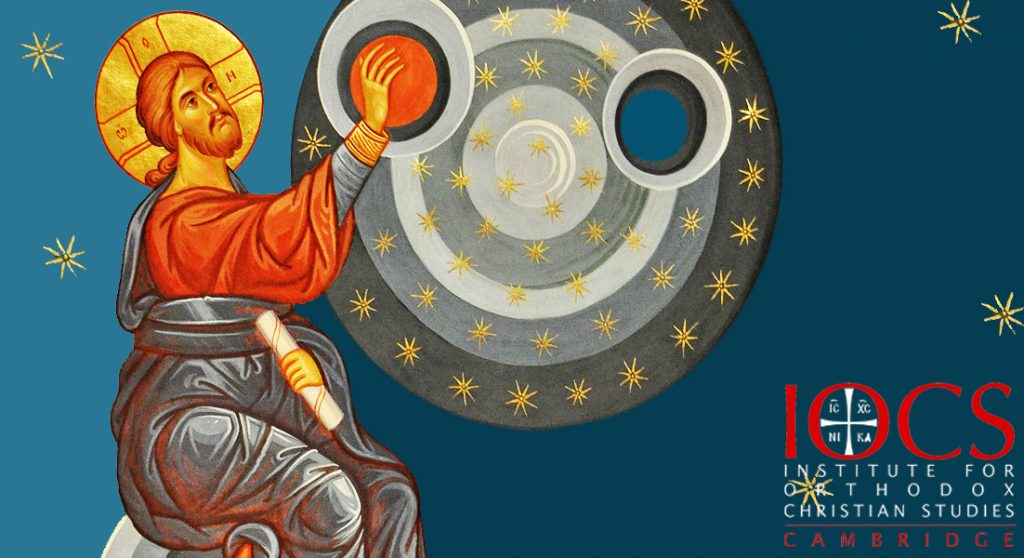This course is part of our ‘Open MA Module’ series. We are now accepting ‘external’ students who can follow and participate in these courses, just like the MA students but without enrolling on the MA Programme.

This postgraduate module/course is taught online by Dr Elizabeth Theokritoff. There will be 10 sessions taught online in real time, the duration of each session being 150 minutes. In each session, a lecture of about 1 hour will be followed by a brief break. Depending on numbers, there may then be discussion in small groups before the full class resumes.
This module is a part of the MA in Christian Theology and the Contemporary World (taught by IOCS and the Cambridge Theological Federation, and awarded by Anglia Ruskin University) but it is also available to students of the MA in Spirituality East and West. We are now also accepting ‘external’ students who can follow and participate in the course just like the MA students, without being enrolled in one of the MA Programmes.
There are two enrolment options for the course participants who are not officially enrolled in the MA programme:
1. Auditors. These students participate in the classroom but cannot write an assignment at the end of the module. They do not receive credits for their participation in the course and consequently they cannot use their participation in this course to continue onto this IOCS MA course, or to enrol or transfer to another university. Auditors are expected to have good knowledge of English in order to follow this Module.
2. Affiliated students. These students participate in the classroom and will write an assignment (essay) which will be assessed properly at the end of the module. Consequently they receive credits which can then be used for continuing on with this MA course with IOCS, or they may carry over their credits to another university. Affiliated students are required to have a BA qualification or higher.
Module Leader: Dr Elizabeth Theokritoff
Teaching Timetable:
- Wednesday 14.30 – 17.00 (BST/GMT) – 14, 28 May; 11, 25 June; 9, 23 July
- Wednesday 14.30 – 17.00 (BST/GMT) – 24 Sept; 8, 22 Oct; 5 Nov
THE FEES FOR THIS COURSE ARE:
Auditors
Course fee – £230
Student fee – £100
IOCS Certificate/Diploma student fee – £30
Students of the Cambridge Theological Federation (CTF) and IOCS MA and PhD students are allowed to audit this course for free.
Affiliated students (receiving university credits)
Course fee – £1,366*
*Payment of this fee is to be made directly to Anglia Ruskin University, once the application has been accepted.
Application
To apply as Auditors please send a CV at info@iocs.cam.ac.uk. To apply as Affiliated Students please go to the Anglia Ruskin University application page here.
The course sessions are:
Session 1: Talking about creation: context, starting points and misconceptions.
Creation, Incarnation and Resurrection in Scripture and early church Fathers.
Session 2: The Word in the world (1):
Patristic writers to the fourth-fifth centuries.
Session 3: The Word in the world (2):
Maximus the Confessor and later developments.
Session 4: The place of man in patristic thought and beyond:
Image and dominion, creation and fall.
Session 5: Ascetic tradition and spiritual life:
Use of the world and matter; practice of virtue and spiritual contemplation.
Session 6: The example of the Saints:
Compassion for all creatures; paradise restored.
Session 7: Worship and sacramental life:
Paradigms for our relationship with the earth.
Session 8: Modern ecological theologies (1).
Building on the practice of virtue: ‘stewardship’, ‘eco-justice’, ‘ecological sin’
Session 9: Modern ecological theologies (2).
Building on worship and prayer: ‘eucharistic ethos’, ‘creation spirituality’
Session 10: Modern ecological theologies (3).
Building on theology: Triune Creator, cosmic Christ, divine wisdom, the life-giving Spirit
This module will engage with some of the underlying questions raised by ecological awareness and the environmental crisis: How do we regard and value the natural world? How do we see the role of the human being in creation and in relation to other creatures? How does this influence the way we live on earth and use its goods? In search of answers, this module will concentrate not on tailor-made ‘eco-theologies’ but on the witness of various facets of the historical Christian tradition, especially that of the Christian East, which is increasingly recognised for the insights of its theology of creation. This exploration of Christian sources is intended to give the student a vantage point from which to critique assumptions about the criteria for ‘eco-friendly’ beliefs and world views, and identify the sorts of ecological action that form a natural expression of Christian faith.
The basis for the module will be sources and practices that are the common heritage of Eastern and Western Christianity: patristic writings of the first millennium and their theology of creation, worship and sacramental life, the ascetic and spiritual tradition, lives of saints ancient and modern. The final three lectures will highlight some major themes and figures in modern ecological theology, suggesting how they draw on sources deep within Christian tradition: asceticism and practice of the virtues; worship, prayer and sacraments; theology.
Each lecture will be followed by a seminar for which the students will be given preparatory reading. In their seminar contributions, students will be encouraged to draw on resources from their own particular tradition in responding to the lecture and readings.
Students are encouraged to purchase Elizabeth Theokritoff, Living in God’s Creation: Orthodox Perspectives on Ecology (St Vladimir’s Seminary Press, 2009), which will serve as a key text for the module.
Please click here to find out more about our MA in Christian Theology and the Contemporary World
Please click here to find out more about our MA in Spirituality East and West.
Enrolment
Please select one of the options below:
